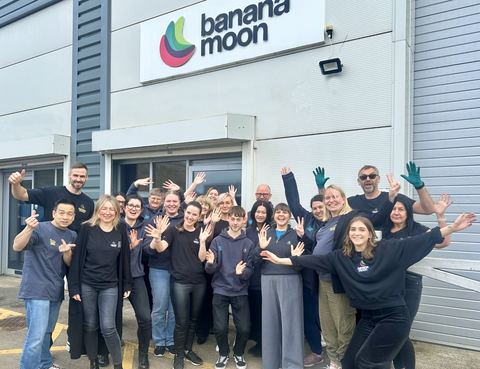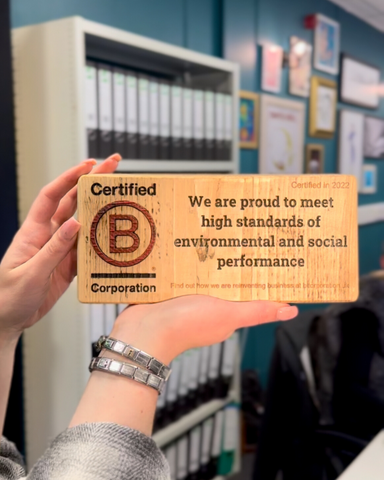Our Environmental Journey
We cut waste, save water, and offer eco garments. Sustainability is woven into all we do at Banana Moon.


Established in 1993, we're a family company that has grown from a lifestyle craft business to an agile, responsible and visionary personalised clothing supplier operating from a 10,000 sq. ft purpose-built facility in Yorkshire, UK.

We are so pleased to announce that Banana Moon has been B-Corp certified! This certification acknowledges our continued commitment to people and our planet and we feel extremely happy and proud to achieve B-Corp certification after years of hard work.
In a hurry for your order? Choose our FAST TRACK option at checkout to receive it in just 3 working days
We’ve compiled the top ten tips for going greener with your laundry.
If your washing machine is old, chances are it’s not the most eco-friendly. Some modern machines run more efficiently, using less electricity and water. Some machines even weigh the load to assess how much water to use and adjust the cycle accordingly. However, you don’t need to spend a fortune on a washing machine to go greener. There are many other tips for using your existing machine more efficiently too.
Not all washing detergents are equal.
Natural Ingredients - Make sure you choose a detergent with natural ingredients rather than petroleum-based chemicals. Plant-based detergents like Ecover or Method are made of biodegradable ingredients which are much better for the planet, as they don’t pollute the sea with harmful microplastics.
Eco-friendly packaging – Liquid detergent comes in big plastic bottles which increase plastic waste and aren’t always recyclable. So, if you do buy liquid detergent, make sure to use a concentrate which uses less packaging and less fuel to transport it due to lower weight. Alternatively, choose a detergent that comes in bottles that are made of 100% recycled plastic. Powdered detergent or dehydrated sheet detergent often comes in cardboard packaging which is biodegradable and much easier to recycle.
The best way to be sure your detergent is eco-friendly is to make your own. A little baking soda, vinegar, and essential oil is all you need to create a biodegradable laundry detergent. If you’re not ready to make the big switch, you could always just swap your fabric softener for a bit of vinegar. Vinegar is a natural fabric softener which neutralises pH, helps wash out the soap, and leaves clothes feeling soft.
You can use a lot less than the recommended detergent amounts on the bottle. If it’s enough to create suds in your machine, then it’s enough to clean it. If you find the window of the machine is filling with bubbles then it’s likely you are using too much.
Tumble drying uses significant amounts of energy; 2.5kwh compared to 0.11kwh of the average household kettle. As such, it’s an area where you can make significant energy savings just by changing your laundry habits. Consider whether you really need to tumble all items. If you don’t need to wear an item quickly, allow it to dry outside on a dry day, or in an airing cupboard. If you don’t have an airing cupboard, consider installing a hanging rail at the top of your stairwell. As heat rises, it’s the perfect spot for drying clothes on hangers. If you must tumble dry, consider using a shorter / lower heat setting and allowing garments to dry completely elsewhere.
Avoid using dryer sheets which are laden with chemical fabric softeners. Instead switch to wool dryer balls which are biodegradable and leave your clothes just as soft. If you enjoy the fragrance that dryer sheets leave on your clothes, add a drop of essential oil to your wool dryer balls.
Every time you wash polyester clothes, microplastics end up in the water supply. The best way to avoid this is to choose natural clothing fibers like cotton and wool. However, with gym kits and outdoor gear it’s not always possible to make the switch completely. So, if you must wash your polyester, consider using a microfibre filter on your machine which limits the amount of microplastics that end up in the water and environment.
Most people know to wash their general laundry at 30 degrees as cooler washes mean less electricity is used. Chances are that most of the time, your clothes are not dirty enough to need a hotter wash. Unless you need to eradicate bacteria, keep it cool.
Are you a stickler for a certain setting on your washer because you think it cleans better? It’s not necessary to wash everything on a 3-hour spin cycle. Most clothes from the week can be effectively cleaned with a quick wash. If you have the option to reduce spin, you can save electricity too.
It’s tempting to do a quick load and keep that washing basket empty. But huge amounts of water and energy could be saved by scheduling your clothes wash once or twice a week. Wait until you have enough for a full load before doing a wash.
Sign up it only takes a second to be the news.












